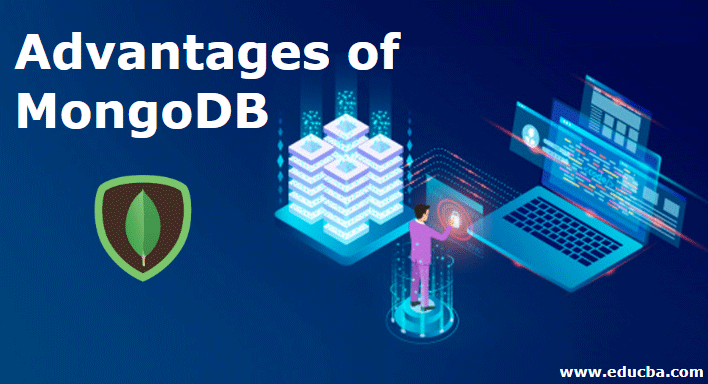Updated May 25, 2023

Introduction to Advantages of MongoDB
The following article Advantages of MongoDB provides a complete guide to the uses and advantages of MongoDB. MongoDB is a non-relational database and easy to scale. It is an open-source database written in C++. It supports ad-hoc query processing. Organizations like Facebook, IBM, etc., presently use it as a back-end database. It stores data in collection format. Content management, analytics, and mobile application system use MongoDB. MongoDB allows you to read the result of a write operation before you run to write the query. It serves all the queries from indexes. It is most useful because it has no relationship and structure data concept needed. It is a NoSQL database. The structure of one single object is clear to the users.
Advantages of MongoDB
Following are the advantages of MongoDB
- It is easy to install, use, and schema-less database.
- Due to it is the ability of a schema-less database, the code which we create defines the schema.
- Data is stored in Binary JSON format, which is key-value pair; no joins complexity is needed.
- It uses RAM to store data; this makes faster access to the data.
- Load balancing can be achieved by using it.
- It supports a database transaction’s ACID (atomicity, consistency, isolation, and durability) property.
- It supports replication; if the primary server goes down during a transaction, the secondary server handles the transaction without human interaction.
- It is cost-effective because it reduces the cost of hardware and storage.
- It can save a lot of data which will help faster query processing.
- The database server ensures data storage across the cluster nodes, effectively eliminating the possibility of a single point of failure.
- Due to the dynamic schema, you can try new things at a lower cost. You don’t need to worry about preparing data before experimenting with it.
Why we Use MongoDB?
- MongoDB is a NoSQL database; it can store data in document format. This database is flexible to handle large volumes of data because it provides a high-performance data storage solution.
- It stores data in document format to change any number of records, add or delete existing fields in the table. It can store complex structures easily and fetch data more accurately.
- Indexing improves the performance of queries or searches in the database.
- It can store any data of any size.
- We use a dynamic database scheme called BSON.
- It supports replication where master-slave works. The master reads and writes, slave copies data from the master, and it will be used for reading purposes only.
- If we have large data distributed on several servers and the server cannot handle the data, auto-sharding is present and will be used. This will not cause failure.
- It supports horizontal scaling, which will result in distributing large amounts of data into several machines.
Where we Use MongoDB?
- If you are going to make a database project with a low budget, MongoDB is the best NoSQL database to set up, manage and work for.
- MongoDB has powerful query processing, so it will help find where data comes in and pull it from a specific location.
- If you have a cloud hosting service, you should set up MongoDB with security guidelines because cloud hosting services are internet-accessible servers.
- We can use MongoDB without worrying about minor details like enforcing integrity and want to create a database with many documents.
- The New York Times uses MongoDB in form-building applications. E.g., photo submissions.
- It is used for back-end storage. E.g., the sourceforge.net site uses it.
- Shutterfly uses MongoDB for various persistent data storage requirements.
- It is used in social networking sites such as Facebook and Instagram because it generates a terabyte of data each minute.
- Question-and-answer discussion forums like Quora utilize it.
Conclusion
MongoDB is a recommended and reliable database when designing a scalable web application and needing to store massive amounts of unstructured data. MongoDB is the best solution if the user is looking for the best availability, faster processing, good backup, and zero loss of information. most importantly, it is free to use.
Recommended Articles
This is a guide to the Advantages of MongoDB. Here we discuss the basic concept, why and where we use MongoDB, and advantages. You may also look at the following articles –
